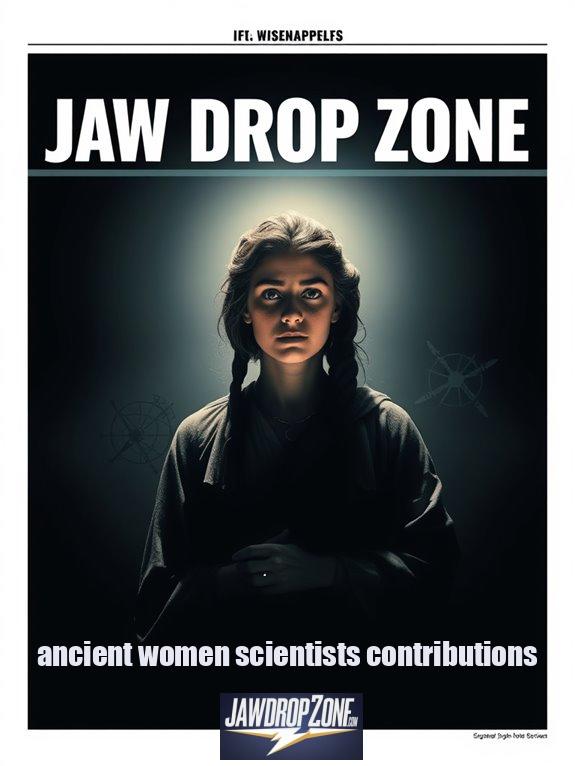Ever wonder how women like Marie Curie and Chien-Shiung Wu changed the course of science? Curie, the first person to snag two Nobel Prizes, revolutionized medicine with her discoveries of radium and polonium. Then there's Wu, who flipped the script on atomic behavior by proving Fermi's theories! These remarkable women didn't just break glass ceilings; they shattered them. Intrigued? There's so much more to uncover about these trailblazers and their inspiring legacies!
Quick Takeaways
- Marie Curie was the first person to win two Nobel Prizes, pioneering research in radioactivity and transforming cancer treatment.
- Chien-Shiung Wu confirmed Fermi's beta decay theory, contributing to major advancements in nuclear physics and the Manhattan Project.
- Lise Meitner co-discovered nuclear fission, making significant theoretical contributions despite being overlooked for a Nobel Prize.
- Dorothy Hodgkin determined the structures of biomolecules, advancing the field of chemistry and earning the Nobel Prize in Chemistry.
- Women's representation in scientific research reached 41% by 2024, highlighting the importance of recognizing female contributions in science.
Celebrating Pioneering Women in Science

In the annals of history, where many remarkable tales often go unnoticed, the contributions of women scientists shine like stars in a night sky. Can you envision a world where groundbreaking discoveries arose from the minds of women who were often overlooked? Meet Marie Curie, the first person ever to snag two Nobel Prizes, a feat so sensational, it left many men in the dust. Her discoveries of radium and polonium didn't just rattle the scientific community; they revolutionized medicine and altered the terrain of cancer treatment.
Then there's Chien-Shiung Wu. You wouldn't believe the impact she made by confirming Fermi's beta decay theory, contributing to the Manhattan Project, and, oh, overturning the parity theorem in physics. Talk about flipping the script! Her experiments, pivotal in demonstrating that the laws of physics can be non-symmetric, challenged long-standing beliefs and opened new avenues in research. When you think about the significance of her work, it's hard not to feel a bit giddy at how even the most entrenched theories can be shaken to their core.
Chien-Shiung Wu flipped the script in physics, confirming theories and shaking established norms—what an astonishing legacy!
And we can't forget Lise Meitner, who found nuclear fission but never got her due at the Nobel Awards. Is that a plot twist or what? This saga could make a nail-biting drama on TV—too bad it's all too real!
Dorothy Hodgkin crafted the structure determination of biomolecules, adding yet another feather to the cap of women in science. You've got to wonder, what if the world had embraced their genius a bit sooner? Women's representation in research reached 41% by 2024, showcasing how vital their contributions have become.
This leads me to why I created this website, Jaw Drop Zone. It's a place for you to plunge into these astonishing stories, and believe me, there's endless material.
Women like Barbara McClintock and Mary-Claire King, who expanded our genetic understanding, serve as reminders: groundbreaking work isn't just left for those with a reputation.
Do you now see how dazzling and important these contributions are? The fabric of our scientific history is woven with their brilliance, and it's high time we recognize it!
Radium Isolation Breakthrough

Radium's isolation wasn't just a scientific feat; it was a daring adventure that unfolded in the late 19th century, a time when the unknown beckoned with both promise and peril.
I was captivated by the Curies' painstaking journey as they:
- Dissolved tons of pitchblende to unearth this mysterious element.
- Employed complex techniques like acid dissolution and filtering.
- Faced health risks without a clue—talk about playing with fire!
- Created radium chloride, revolutionizing our understanding of radioactivity.
Can you envision their thrill and terror?
Join me at Jaw Drop Zone, where we explore history's hidden gems!
References
- https://www.bestcolleges.com/blog/10-women-who-made-scientific-history/
- https://emmatheteachie.com/10-amazing-women-scientists-who-changed-the-world/
- https://www.discovermagazine.com/the-sciences/meet-10-women-in-science-who-changed-the-world
- https://obamawhitehouse.archives.gov/women-in-stem
- https://www.coursera.org/articles/famous-female-scientists
- http://large.stanford.edu/courses/2021/ph241/lui2/
- https://ccaps.umn.edu/story/trailblazing-women-science-14-inspiring-female-leaders-who-changed-world
- https://en.wikipedia.org/wiki/Radium
- https://oars.northeastern.edu/2024/03/26/female-scientists-who-changed-the-world/
- https://www.mariecurie.org.uk/about-us/our-history/marie-curie-the-scientist






